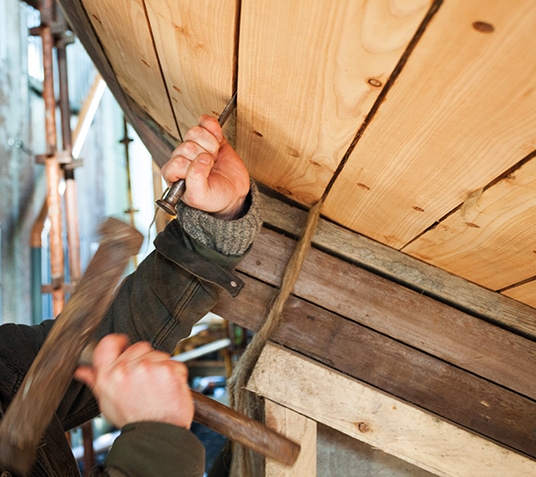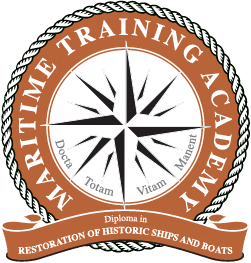Restoration of Historic Ships & Boats Course
Become a Qualified Maritime Restoration Specialist
This historic ship restoration course is a great introduction to the field and makes a great starting point for many different types of learners such as; Those researching the maritime history, anyone taking part in any form of marine engineering or a boatbuilding apprenticeship, somebody looking to get into or further build their knowledge of ship/boat restoration.
This course does not require a certain level of experience prior to starting, as this course is designed to be useful for beginners and experienced maritime industry workers alike.

Duration:
12 – 18 months

Modules:
10 in total

Cost:
Diploma: £3,195
Certificate: £2,295

Recognised by: 
Historic Ship Conservation & Structural Repair Training
This Restoration of Historic Ships & Boats course will teach you all the skills you need to bring an old boat back to its original state. With clear and easy to follow guidelines, our course will allow you to fulfil your own vision and understand the process in its entirety. It will further your knowledge on ship/boat restoration, conservation and on what type of ships/boats to try and restore.
We also offer an Art on Superyachts course, which could provide the perfect progression from this online diploma if you are looking to bring the same care and attention to the interior of a vessel.

Course Structure
The course consists of 10 modules. All students are required to successfully complete and pass the module assignments. Diploma students will also be required to sit and pass a final examination.
1. Deciding On A Vessel To Restore
- Assessing your needs and aspirations
- Dreams to reality
- Building and finding the right team
- Project research
- Evaluation of the potential project
- Acquisition of the vessel
- What skills are required
- Types of Historic Vessels
- Historic Ships Registers and the politics of funding for ship preservation
2. Support & Finance
- Where/when to restore
- Developing a plan for Restoration/Conservation
- Budgeting and costs
- Sourcing Funding
- Project management
- Sourcing original or replica parts
- Could a replica vessel be the better option
- Marketing your project/public interest
- Case study HMS WARRIOR
3. Managing The Process
- “SOLAS” Requirements
- Location of vessel/Stability
- Legal requirements
- VAT/Charitable Status
- Condition survey on older vessels
- Reaching a decision on Conservation or Restoration
- Conservation of the vessel while work in progress
- Cast Study SCOT II
4. Preservation Or Restoration/Rebuild
- Will she be preserved or restored
- Reconstruction techniques
- Reconstruction-Riveted Ships/Boats
- Reconstruction-Wooden Ships/Boats
- Adaptation for different use
- Sails/Rig types
- Assessing the historical importance of the vessel
- Common ship/boatbuilding terms
- Cast Study SS GREAT BRITAIN
5. The Restoration Project
- History/Background
- Construction techniques
- Designers/old ships plans
- How much original to keep/compromise
- Health & Safety
- Re-designs what is required
- Who can help and where to find them
- Sub-Contracting/Tools/Machinery/required
- Case Study MEDWAY QUEEN
6. Mechanical Systems/Steam Or Diesel
- Propulsion – engines/stern gear/rudders
- Conforming to SOLAS/Class regulations
- Modern systems required
- Layout design/steam and or diesel
- Safety equipment required/Nav aids
- Health & Safety during Fit-Out
- Electrical systems/fire systems
- Painting/finishing
7. Keeping The Project/Momentum Going
- New versus old in the build
- How much can be reused
- What if?
- Finding & Keeping Volunteers
- Skills required from volunteers
- Fund raising campaigns
- Press & Media
- Still to decide
8. Providing Outcomes For Employment/Training Opportunities
- Knowledge not passed on is just lost
- Main benefits of the project
- Can it provide jobs/training opportunities
- Health & Safety for apprentices and the public
- Skills required for training apprentices and such
- Possible community based benefits
- Possible Commercial benefits
- Challenges of a volunteer workforce
9. Use Of The Vessel Once Complete
- Launching/sea trials
- Who is to benefit from the completed vessel
- Museum Vessel?
- Working Vessel?
- Static Display Vessel?
- Training Vessel?
- Commercial/business use Vessel
- Business case for future care and maintenance of the Vessel
10. Future Upkeep
- Maintenance
- Future funding requirements
- Added value to Maritime History
- Surveys required
- Who is to look after the vessel once completed
- Who will own the vessel and look after the upkeep
- How to thank Volunteers and Benefactors
- Long term sustainability
- Case Studies CANGARDA. HMS TRINCOMALEE, other notable vessels
Career Pathway
Career path:
from almost any walk of life but with a passion for history undertaking numerous different aspects of the preservation of historic craft both large and small.
Salary:
From voluntary work up to £60K per annum as a Project Director.
Duties:
Practical maintenance and restoration work, historical research, fundraising or administration.
Meet the Course Director
Ian Biles
Managing Director att Maritime Services International
Ian has led Maritime Services International to become one of the world’s leading surveying companies. Ian’s qualifications include: Master Mariner, RYA Yachtmaster Ocean, Naval Architect (BEng Ship Science) and Business Management (MA Business Management).
Ian started sailing with his father at the age of 12 and as a result went to sea upon finishing school. He sailed worldwide for 13 years on a range of commercial ships and spent his leave sailing yachts around the UK and in the Mediterranean.
During his career he has worked on the Cutty Sark, Discovery, Chauncy Maples, Robin and was the lead consultant on the restoration of the Yavari on Lake Titicaca in Peru.


DIPLOMA IN RESTORATION OF HISTORICAL SHIPS & BOATS
On passing the Diploma, you will receive the above icon. Please use it on your business cards, LinkedIn profile and website(s)!
You can also use these letters after your name: MTA Dip RHSB
Why Choose The Maritime Training Academy?

Flexible
Online learning allows you to study in your own time, at your own pace from anywhere in the world. This saves on travel and classroom costs and allows you to fit your studies around your job and progress your career.

Supportive
While the nature of distance learning is independent study, we recognise the importance of support. Students can contact us at any time during their course for assistance and our team of industry experts are always on hand for advice.

Expertise
We have over 50 industry experts writing, developing and advising on our course material. We truly believe that allowing students to tap into their expertise and knowledge is of the utmost importance to fulfil your dream career.
If you would prefer to complete this as a classroom-based course, please contact us.
FAQs
How long do the courses take to complete? What's the difference between a Diploma and a Certificate? Read through our Frequently Asked Questions below to find out the answer.
















